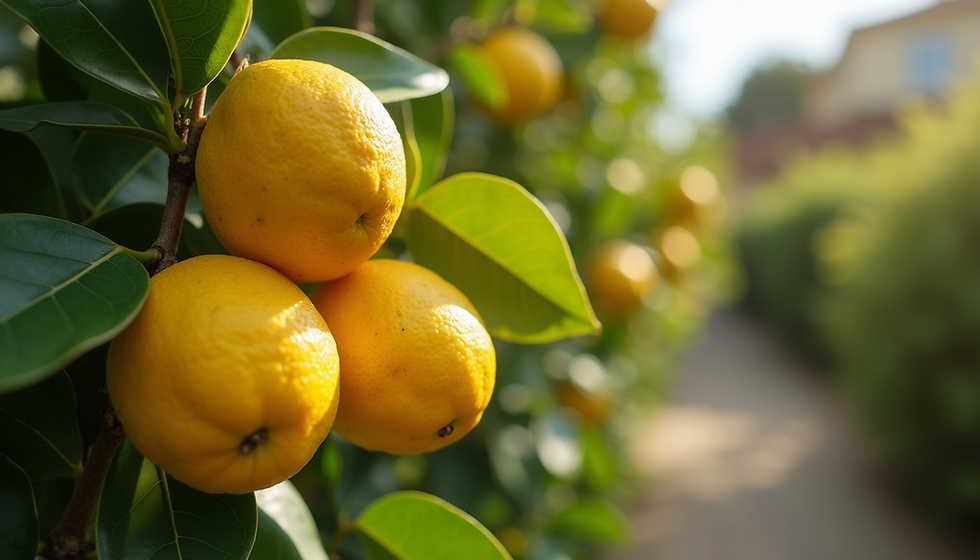How to Grow Healthy Citrus Trees in Perth
- stuart taylor

- Nov 10
- 3 min read
Growing citrus trees can be incredibly rewarding, especially in a climate as suitable as Perth's. The right varieties, proper care, and affirming practices can lead to a bountiful harvest of juicy fruits. Whether you are an experienced gardener or just starting, this guide will help you cultivate healthy citrus trees that thrive in the unique conditions of Western Australia.
Best Citrus Varieties for Perth's Climate
Perth's climate can be a boon for citrus growing, primarily due to its warm summers and mild winters. Here are some citrus varieties that are well-suited to the local environment:
1. Lemon Trees
Lemons are one of the easiest citrus to grow in Perth. Varieties like the 'Eureka' are popular because they produce year-round fruit. Additionally, 'Lisbon' lemons are also excellent choices due to their high yield and disease resistance.
2. Orange Trees
Navel oranges, such as the 'Washington Navel', are perfect for Perth's climate. These trees are self-fertilizing, and their sweet fruit can be enjoyed fresh or juiced.
3. Mandarins
Mandarins are a great option for smaller gardens. Varieties like 'Imperial' and 'Honey Murcott' not only produce sweet fruit but are also relatively hardy and require less maintenance.
4. Lime Trees
If you have space, consider planting a 'Tahitian Lime' or 'Kaffir Lime'. Both types thrive in Perth's conditions and add unique flavors to many culinary dishes.

Soil Preparation for Healthy Growth
The foundation for any healthy garden is quality soil. Before planting, you need to ensure that your soil is ready to support healthy citrus trees.
1. Testing pH Levels
Citrus trees prefer slightly acidic to neutral soil, with a pH of 6-7. Use a soil testing kit to check the pH levels. If your soil is too alkaline, consider adding sulfur to lower the pH.
2. Adding Organic Matter
Enrich your soil with plenty of organic matter, such as compost or well-rotted manure. This not only provides essential nutrients but also improves soil structure and drainage.
3. Drainage
Ensure good drainage by amending clay soils with sand or perlite. Citrus trees dislike waterlogged roots, so raised beds or mounds can also be helpful.

Watering Tips for Optimal Growth
Proper watering is crucial for citrus trees. While these trees require consistent moisture, the amount and frequency can vary based on weather and soil conditions.
1. Deep Watering
Citrus trees thrive on deep watering rather than frequent shallow watering. Aim for about 1 inch of water per week, either through rainfall or irrigation.
2. Watering Schedule
In the heat of summer, check your trees twice a week, especially if they are young. It’s beneficial to water in the early morning to minimize evaporation.
3. Mulching
Applying mulch around the base helps retain moisture, suppress weeds, and maintain soil temperature. Use organic materials like straw, wood chips, or bark.

Effective Pest Management Strategies
Pest control is essential for maintaining the health of your citrus trees. Implementing preventive measures can greatly reduce pest infestations.
1. Monitoring
Regularly inspect your trees for signs of pests like aphids, scale, or mites. Early detection is key to managing any potential outbreaks.
2. Natural Predators
Encourage beneficial insects such as ladybugs and lacewings, which feed on common pests. Planting companion flowers and herbs can attract these helpful creatures.
3. Organic Insecticides
If you encounter severe infestations, consider organic insecticides like neem oil or insecticidal soap. Always follow instructions carefully to minimize harm to beneficial insects.
Encouraging Healthy Growth Year-Round
Caring for your citrus trees involves ongoing maintenance throughout the year. Here are some essential tasks to keep your trees thriving:
1. Fertilizing
Citrus trees are heavy feeders. Use a slow-release citrus fertilizer formulated for your region, ensuring it includes essential nutrients like nitrogen, phosphorus, and potassium.
2. Pruning
Pruning not only helps maintain tree shape but also encourages air circulation, reducing the risk of disease. Remove any dead or diseased branches and thin out crowded areas.
3. Seasonal Care
During winter, ensure adequate protection against frost by covering young trees if needed. In summer, watch for signs of heat stress and adjust your watering schedule accordingly.
Incorporating these practices into your gardening routine will lead to vibrant, fruitful citrus trees. The health and bounty of your garden reflect the effort and care you put into it.
Happy gardening! With dedication and the right techniques, you'll soon enjoy the sweet rewards of your hard work.




Comments